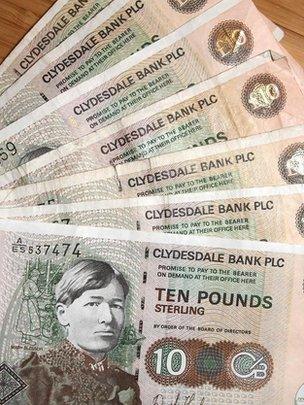Gers figures show Scotland's debt 'lower than UK level'
- Published

Scotland's debt represents 2.3% of Scottish GPD, while the UK deficit is 6.0% of GDP
Scotland spent more cash than it raised last year, although debt levels were lower than the UK as a whole, official figures have suggested.
Scotland had debt of £3.4bn, or 2.3% of Gross Domestic Product, if a geographical share of North Sea oil was included.
Equivalent numbers for the UK showed a deficit of £92.3bn, or 6.0% of GDP.
The Government Expenditure and Revenue Scotland (Gers) figures for 2011-12 set out actual levels of tax and spending.
Scottish ministers, who will stage an independence referendum in 2014, said the UK figures showed Scotland "more than pays her way".
The Westminster government argued the "extremely volatile" nature of oil prices meant they were far better managed in a UK-wide context.
At the same time, the Scottish Trades Union Congress warned against the two sides of the independence debate "spinning" the figures to suit their own case, when tackling inequality was the most pressing issue.
The Scottish government-published spending figures, external said:
Total Scottish public sector revenue (excluding North Sea income) was estimated at £46.3bn (8.2% of the total UK non-North Sea revenue.)
Including a per capita share of North Sea income, Scottish public sector revenue was estimated at £47.2bn (8.2% of the UK total public sector revenue.)
Including an geographical share of North Sea income, Scottish public sector revenue was estimated at £56.9bn (9.9% of UK total public sector revenue.)
Scottish Finance Secretary John Swinney said Scotland was better off to the tune of £824 per person and, over the last five years, was in a stronger position relative to the UK as a whole by £12.6bn.
He added: "These official figures show Scotland continues to contribute proportionately more to the UK Treasury than we receive in public spending.
"In 2011-12, Scotland generated 9.9% of UK revenues with 8.4% of the population, while only receiving 9.3% of UK public spending back from the UK government.
"This demonstrates beyond any doubt that Scotland more than pays her way in the UK."
For the UK government, Scottish Secretary Michael Moore said the figures showed how Scotland benefitted from being part of the UK.
"The rise in oil revenues is welcome and shows that the UK's regulatory and tax regime is supporting the industry to get the most out of North Sea oil and gas," he said.
"While the sector is valuable to our country, the past decade has shown that the price of oil can be extremely volatile from year to year.
"This underlying volatility can be much better managed inside the larger UK where oil and gas revenues represent a smaller percentage of overall tax revenues."
The figures also said:
Total public sector spending for the benefit of Scotland by the Scottish and UK governments and other public sector areas was £64.5bn, or 9.3% of total UK public sector expenditure (including a per capita share of UK debt interest payments).
The estimated current budget balance for the public sector in Scotland was a deficit of £14.0bn without North Sea revenue, £13bn including a per capita share of North Sea revenue, or £3.4bn including a geographical share of North Sea revenue.
The UK as a whole ran a current budget deficit, including North Sea revenue, of £92.3bn, or 6% of GDP.
Like the UK government, Scottish Labour's Ken Macintosh said the figures showed the benefit to all Scots of remaining part of the UK.
"We do not simply have a shared economy but also shared services, a shared pensions system and our largest trading partner is the rest of the UK."
Green MSP Patrick Harvie said the figures had shown the strength of Scotland's finances, but added: "They are also a reminder that we face risk and uncertainty if we plan to rely forever on unsustainable fossil fuel reserves.
"Scots who are as yet undecided about next year's referendum have the right to know how we plan to reduce that over-reliance."
STUC general secretary Grahame Smith said: "Today's figures confirm our view that neither side of the independence debate should be spinning messages on Scotland's fiscal position.
"As STUC has constantly stated, Scotland's relative fiscal position as of last year should not be used to justify the case against independence, but neither can it say much about the position post 2016 and beyond.
"The challenge that matters in Scotland, whether independent or as part of the UK, will be how wealth is redistributed and that is a question of tax, public services and how we go about improving pay equality in Scotland."
- Published6 March 2013
- Published23 February 2013
- Published1 February 2013